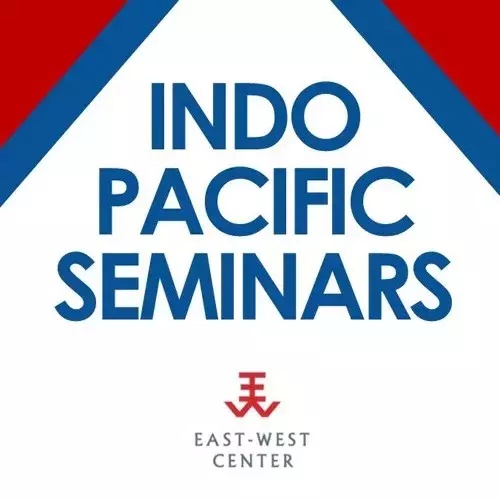Error message

OFFICE/DEPARTMENT
The East-West Center in Washington invites you to an
Indo-Pacific Political Economy and Trade Virtual Seminar:
Understanding Semiconductor Supply Chain Disruption: Framing the US-Japan Response & Exploring Partnerships with Southeast Asia
Featuring:
Mr. Jeffrey D. Bean
Visiting Fellow,
U.S.-Japan-Southeast Asia Partnership in a Dynamic Asia Fellowship
East-West Center in Washington
Dr. Satu P. Limaye (Moderator)
Vice President, East-West Center &
Director, East-West Center in Washington
Global semiconductor companies, including US and Japanese industry leaders, face challenges due to supply chain disruption driven by several factors, including trade, national security, and transnational issues. This presentation discussed the

geopolitical trends contributing to an uncertain environment, give an overview of the semiconductor industry and typology of disruption, and outline findings for what the US and Japanese governments could do to assist specific Southeast Asian countries in becoming more attractive destinations as semiconductor companies weigh potential responses.
Speaker Biographies
Jeffrey D. Bean is editor of the Asia Policy Blog, CogitAsia, for the Center for Strategic & International Studies (CSIS). Mr. Bean’s research focus and areas of analysis include emerging technology, non-traditional threats, trade, and US foreign and security policy in the Indo-Pacific. Previously, he worked as a research assistant with the Freeman Chair in China Studies at CSIS, where he coordinated projects that focused on Asian regional cooperation and US-China relations. He is the author of over two dozen articles and reports as well as the producer of nearly one hundred CSIS podcasts on policy issues in the Indo-Pacific. He is co-editor of Asia's Response to Climate Change and Natural Disasters: Implications for an Evolving Regional Architecture (CSIS, 2010). Mr. Bean holds an M.A. in security policy studies with concentrations in emerging technology and transnational threats from George Washington University’s Elliott School of International Affairs, where he was a highest honors fellow, and a B.A. in international affairs and political science from James Madison University.
Satu Limaye is Vice President of the East-West Center and the Director of the East-West Center in Washington where he created and now directs the Asia Matters for America initiative and is the founding editor of the Asia Pacific Bulletin. He is also a Senior Advisor at CNA Corp (Center for Naval Analyses) and Senior Fellow on Asia History and Policy at the Foreign Policy Institute at Paul H. Nitze School of International Studies (SAIS). He is a magna cum laude and Phi Beta Kappa graduate of Georgetown University and received his doctorate from Oxford University (Magdalen College) where he was a George C. Marshall Scholar. Recent publications include: “America’s ‘Pacific Principle’ in an Indivisible Pacific Islands Region,” (Asia-Pacific Bulletin); “Despite Stumbles, America’s Engagement with Southeast Runs Deep,” (Global Asia); Raging Waters: China, India, Bangladesh, and Brahmaputra Water Politics (Marine Corps University Press); Russia’s Peripheral Relevance to US-Indo Pacific Relations (Center for the National Interest).
The East-West Center in Washington invites you to an
Indo-Pacific Political Economy and Trade Virtual Seminar:
Understanding Semiconductor Supply Chain Disruption: Framing the US-Japan Response & Exploring Partnerships with Southeast Asia
Featuring:
Mr. Jeffrey D. Bean
Visiting Fellow,
U.S.-Japan-Southeast Asia Partnership in a Dynamic Asia Fellowship
East-West Center in Washington
Dr. Satu P. Limaye (Moderator)
Vice President, East-West Center &
Director, East-West Center in Washington
Global semiconductor companies, including US and Japanese industry leaders, face challenges due to supply chain disruption driven by several factors, including trade, national security, and transnational issues. This presentation discussed the

geopolitical trends contributing to an uncertain environment, give an overview of the semiconductor industry and typology of disruption, and outline findings for what the US and Japanese governments could do to assist specific Southeast Asian countries in becoming more attractive destinations as semiconductor companies weigh potential responses.
Speaker Biographies
Jeffrey D. Bean is editor of the Asia Policy Blog, CogitAsia, for the Center for Strategic & International Studies (CSIS). Mr. Bean’s research focus and areas of analysis include emerging technology, non-traditional threats, trade, and US foreign and security policy in the Indo-Pacific. Previously, he worked as a research assistant with the Freeman Chair in China Studies at CSIS, where he coordinated projects that focused on Asian regional cooperation and US-China relations. He is the author of over two dozen articles and reports as well as the producer of nearly one hundred CSIS podcasts on policy issues in the Indo-Pacific. He is co-editor of Asia's Response to Climate Change and Natural Disasters: Implications for an Evolving Regional Architecture (CSIS, 2010). Mr. Bean holds an M.A. in security policy studies with concentrations in emerging technology and transnational threats from George Washington University’s Elliott School of International Affairs, where he was a highest honors fellow, and a B.A. in international affairs and political science from James Madison University.
Satu Limaye is Vice President of the East-West Center and the Director of the East-West Center in Washington where he created and now directs the Asia Matters for America initiative and is the founding editor of the Asia Pacific Bulletin. He is also a Senior Advisor at CNA Corp (Center for Naval Analyses) and Senior Fellow on Asia History and Policy at the Foreign Policy Institute at Paul H. Nitze School of International Studies (SAIS). He is a magna cum laude and Phi Beta Kappa graduate of Georgetown University and received his doctorate from Oxford University (Magdalen College) where he was a George C. Marshall Scholar. Recent publications include: “America’s ‘Pacific Principle’ in an Indivisible Pacific Islands Region,” (Asia-Pacific Bulletin); “Despite Stumbles, America’s Engagement with Southeast Runs Deep,” (Global Asia); Raging Waters: China, India, Bangladesh, and Brahmaputra Water Politics (Marine Corps University Press); Russia’s Peripheral Relevance to US-Indo Pacific Relations (Center for the National Interest).








